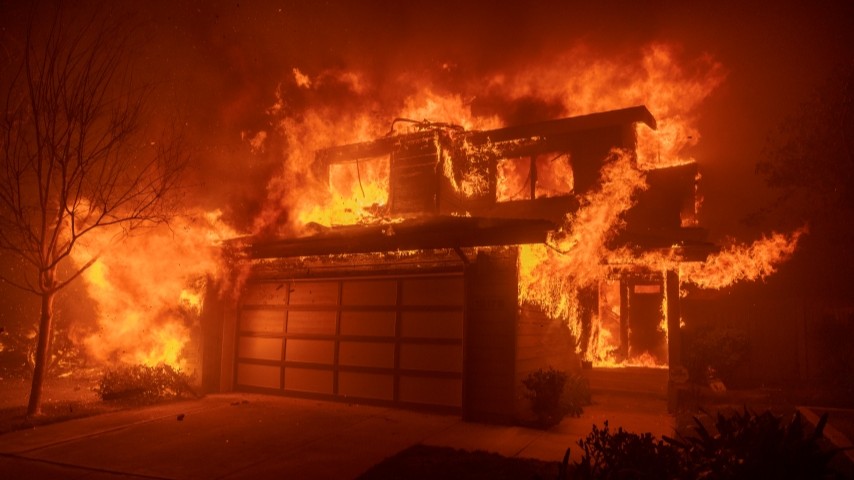The Climate Crisis Will End Home Ownership as We Know It and Eventually Crash the Economy
Photo by David McNew/Getty Images
The path we are on is crystal clear. Los Angeles is on fire. Large swaths of North Carolina are at the start of a long rebuilding effort in the wake of certified climate catastrophe Hurricane Helene. Home insurance in Florida is nearly a relic of the past at this point. The climate crisis is here, and it will only get worse. Anyone who believes otherwise is in pure denial about what scientists have been warning us about since before most of us were born.
Under the current system, the vast majority of us simply will not be able to purchase a home in climate crisis America. The infrastructure around that fundamental promise to the American people is decaying. Insurance companies are deserting climate change-stricken areas, and if you cannot get your home insured, you cannot get a mortgage. If people can’t buy houses that insurers say could easily be destroyed by climate shocks, then the value of those houses go down. If the value of the houses go down, so do the property taxes the state collects from those communities at climate risk. If the state collects less property taxes, they provide less services to the area, creating a death spiral where the only logical conclusion is that no one lives in these communities vulnerable to climate impacts.
But in a world where climate change is only worsening, what does it mean to be in an area of the country vulnerable to climate impacts? Is the uptick in heat deaths in the United States a climate impact? What about the historic “megadrought” that destroys ever larger swaths of the American west each year? Hurricanes keep getting faster due to climate change, which means that they affect more parts of the United States. Many areas that may not have been considered risks before are becoming more concerning for home insurers, and as this New York Times map demonstrates, huge chunks of California, parts of Oklahoma and New Mexico, most of Florida, and the coasts of North Carolina, South Carolina and Louisiana have all seen insurers flee their markets in recent years.
Climate change is making home insurance a thing of the past for a lot of vulnerable areas. www.nytimes.com/interactive/…
— Jacob Weindling (@jakeweindling.bsky.social) January 8, 2025 at 8:38 AM
The National Bureau of Economic Research published a working paper studying insurance in California, and concluded that there was a catch-22 at the base of the increasing unaffordability of insurance, both for the insured and the insurer.
We document striking variation in insurers’ risk pricing strategies. Firms that rely on coarser measures of wildfire risk charge relatively high prices in high-risk market segments — or choose not to serve these areas at all. Empirical results are consistent with a winner’s curse, where firms with less granular pricing strategies face higher expected losses. A theoretical model of a market for natural hazard insurance that incorporates both price regulation and asymmetric information across insurers helps rationalize the empirical patterns we document. Our results highlight the underappreciated importance of the winner’s curse as a driver of high prices and limited participation in insurance markets for large, hard-to-model risks.
This is not sustainable for anyone. Both Louisiana and Florida had insurers recently go insolvent after hurricanes. One way these companies have reacted to the crisis is to simply cut coverage for so-called natural disasters like hurricanes and fires, effectively making them useless to this new world quite literally shaped by the climate crisis.
The Wall Street Journal detailed how insurance and taxes now cost more than mortgages for many homeowners. Interest rates and the severe lack of housing supply pushing up housing prices is only one part of the problem, and there is a swelling predicament in insurance that is eclipsing the scale of the home affordability crisis in some areas of the United States. We are barreling into a climate crisis-defined future where the only people who will be able to afford a home in large parts of the country are those who can purchase it outright without needing a loan.
Using my finance brain, I simply cannot see how this doesn’t eventually lead to some kind of economic crash on the scale of the 2008 Great Recession or worse. The economic nature of climate change is one of a death spiral, as the flames or waves or any other one of nature’s deadly weapons engulf a community, causing billions in damage (cumulatively adding up to $38 trillion lost every year by 2050). This depletes economic resources, and when it comes time to reinvest and rebuild, these areas are less attractive to live in and thus generate less revenue.
Scale that to a national level and you have something like the 2008 crisis where the bedrock of the community, the home, plummets in value, dragging everything else to hell with it. The historic January fire engulfing Los Angeles is providing further proof that the immense scale of climate change is such that when the flames come for one of us, they eventually come for all of us.